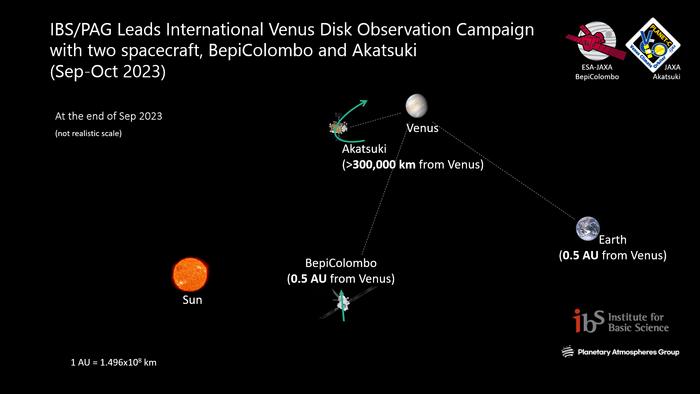Planetary Atmospheres Group (PAG) within the Institute for Basic Science (IBS) is organizing a 2023 Venus atmosphere observation campaign. The PAG-IBS team, led by Dr. LEE Yeon Joo, is also inviting international telescope teams to collaborate for Venus disk data acquisition from September to October 2023. This campaign will offer a unique opportunity to study the atmosphere of the Earth’s twin simultaneously from three different locations in the solar system.

Credit: Institute for Basic Science
Planetary Atmospheres Group (PAG) within the Institute for Basic Science (IBS) is organizing a 2023 Venus atmosphere observation campaign. The PAG-IBS team, led by Dr. LEE Yeon Joo, is also inviting international telescope teams to collaborate for Venus disk data acquisition from September to October 2023. This campaign will offer a unique opportunity to study the atmosphere of the Earth’s twin simultaneously from three different locations in the solar system.
One of the main objectives of the mission is solving the mystery of the ‘unknown absorber’ in the Venusian upper clouds. While Venus’ atmosphere is primarily composed of carbon dioxide (CO2), it exhibits significant absorption of solar radiation across a wide range of wavelengths, including ultraviolet (UV) and visible (VIS) ranges. The unknown absorbers in Venus’ atmosphere refer to unidentified substances or processes that contribute to the absorption of solar radiation in the planet’s atmosphere.
The presence of such unknown absorbers has intrigued astronomers for almost a century since its first detection in ground-based UV images. The known absorbers in Venus’ atmosphere, such as sulfur dioxide, can explain some, but not all, of the observed near-UV and VIS absorption. There are indications that other compounds or atmospheric processes are involved in absorbing solar radiation, but their precise nature and composition are still uncertain.
Another objective of the campaign is to explore the high variability of sulfur dioxide gas above the clouds of Venus, which saw drastic changes in its abundance in the past decades. These changes are thought to be associated with Venus’s surface volcano activities. For example, an active volcano has recently been identified using NASA’s Magellan data. Future Venus missions, such as EnVision and VERITAS, will search for surface volcanoes more intensively.
For this campaign, international scientific collaboration is being established with the two spacecraft and ground-based telescope teams. So far, astronomers from South Korea, Japan, Spain, Germany, Switzerland, and Russia joined the project.
The study will utilize data acquired by the JAXA’s Akatsuki orbiter, which is orbiting Venus from a 300,000 km distance. In addition, ESA-JAXA’s BepiColombo Mercury mission is going to make faraway observations of Venus at the end of September, during its cruise toward Mercury. BepiColombo’s UV spectrometer and Akatsuki’s UV imager will observe the dayside disk of Venus. Such short-wavelength observations are available only from space, as the Earth’s ozone layer blocks ground-based telescopes from acquiring UV data.
Meanwhile, Ground-based telescope teams plan to obtain Venus data simultaneously in coordination with these two space missions. Ground-based data will complement spacecraft measurements which will provide a more complete picture of the atmospheric condition near the cloud-top level. The overall data acquired by this campaign will cover a broad wavelength range, from near UV to near-infrared, providing essential information for scientific analysis of Venus.
This is a follow-up campaign after the previous one in 2020, and it is hoped that the researchers may accomplish a better understanding of UV absorbers near the cloud-top level atmosphere on Venus.




